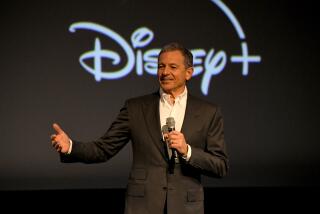Eisner Earns $203 Million but No Bonus : Executives: The Disney chairman’s compensation is a record for the CEO of a public company.
- Share via
Walt Disney Co. Chairman Michael D. Eisner didn’t get a 1993 bonus check--largely as a result of problems at the Euro Disney theme park--but he still took home $203.02 million.
That’s a record for a chief executive of a U.S. public company, and the mighty bucks no doubt will make Eisner last year’s highest-paid corporate leader. Indeed, the only person standing between Eisner and the Guinness Book of World Records in the annual pay category is former financier Michael Milken, who earned $550 million in 1986 trading junk bonds at Drexel Burnham Lambert.
“You don’t have to rent the Dorothy Chandler Pavilion for a benefit concert for him because he didn’t get a bonus. He’ll get by,” said executive compensation expert Graef S. Crystal, who designed Eisner’s pay and incentive package a decade ago.
According to Disney’s annual proxy statement released Monday, almost all of Eisner’s total compensation in the fiscal year ended Sept. 30 came from the $202.3-million profit he made when he exercised options on 5.4 million shares at the end of 1992 in anticipation of higher taxes from the Clinton Administration. Added to that was his annual $750,000 salary--frozen at that level until 1998--and $9,667 in miscellaneous pocket change.
For the first time, neither Eisner nor Disney President Frank Wells (who exercised $60 million worth of options) received a bonus, because Disney’s return on shareholder equity did not reach the level required to trigger the added pay, a factor due entirely to the drag on the company from Euro Disney. Under Eisner’s contract, Disney must post a return on equity of at least 11%. The company’s return was 13% before Euro Disney and other adjustments, which chopped the return to 6%.
Disney executives declined to comment on Eisner’s pay.
A whopping total had been expected ever since the company disclosed that Eisner was exercising his options before President Clinton took office.
Indeed, as part of Clinton’s first-year budget deal, upper-income taxes were raised. Crystal estimated that Eisner personally saved about $17 million by exercising the options in late 1992.
Eisner still has options on about 8 million shares that he may exercise in the future. At today’s value, they are worth about $175 million.
Although expected, the disclosure of Eisner’s one-year compensation comes at an awkward time for the company because it is stumbling due to problems at Euro Disney.
The company’s net income plunged 63% in the year ended Sept. 30 to $299.8 million, largely due to charges related to Euro Disney. The park near Paris has suffered from the slow European economy, the strong French franc and the tightfistedness of tourists visiting the park.
Disney owns 49% of the park’s parent company. It is currently negotiating with Euro Disney’s lenders on a restructuring plan.
In a recent French magazine interview, Eisner said that closing the park was one option, although most observers interpret that and other ominous statements from the company as a negotiating ploy.
*
Who got the biggest bonus at Disney? Vice Chairman Roy E. Disney, nephew of founder Walt Disney and a man estimated by Forbes magazine to be worth $540 million. Disney, who oversees animation, received a $450,000 bonus, according to the proxy, the highest among senior executives.
Separately, Disney said Monday that it is cooperating in helping to produce an audit of Euro Disney and denied a complaint by three French banks that it is not doing so.
On Monday, a spokesman for Banque Nationale de Paris said that BNP, Banque Indosuez, and Caisse des Depots et Consignations had sent a letter to Disney complaining of Disney’s non-cooperation.
Reuters contributed to this report.
More to Read
The biggest entertainment stories
Get our big stories about Hollywood, film, television, music, arts, culture and more right in your inbox as soon as they publish.
You may occasionally receive promotional content from the Los Angeles Times.










